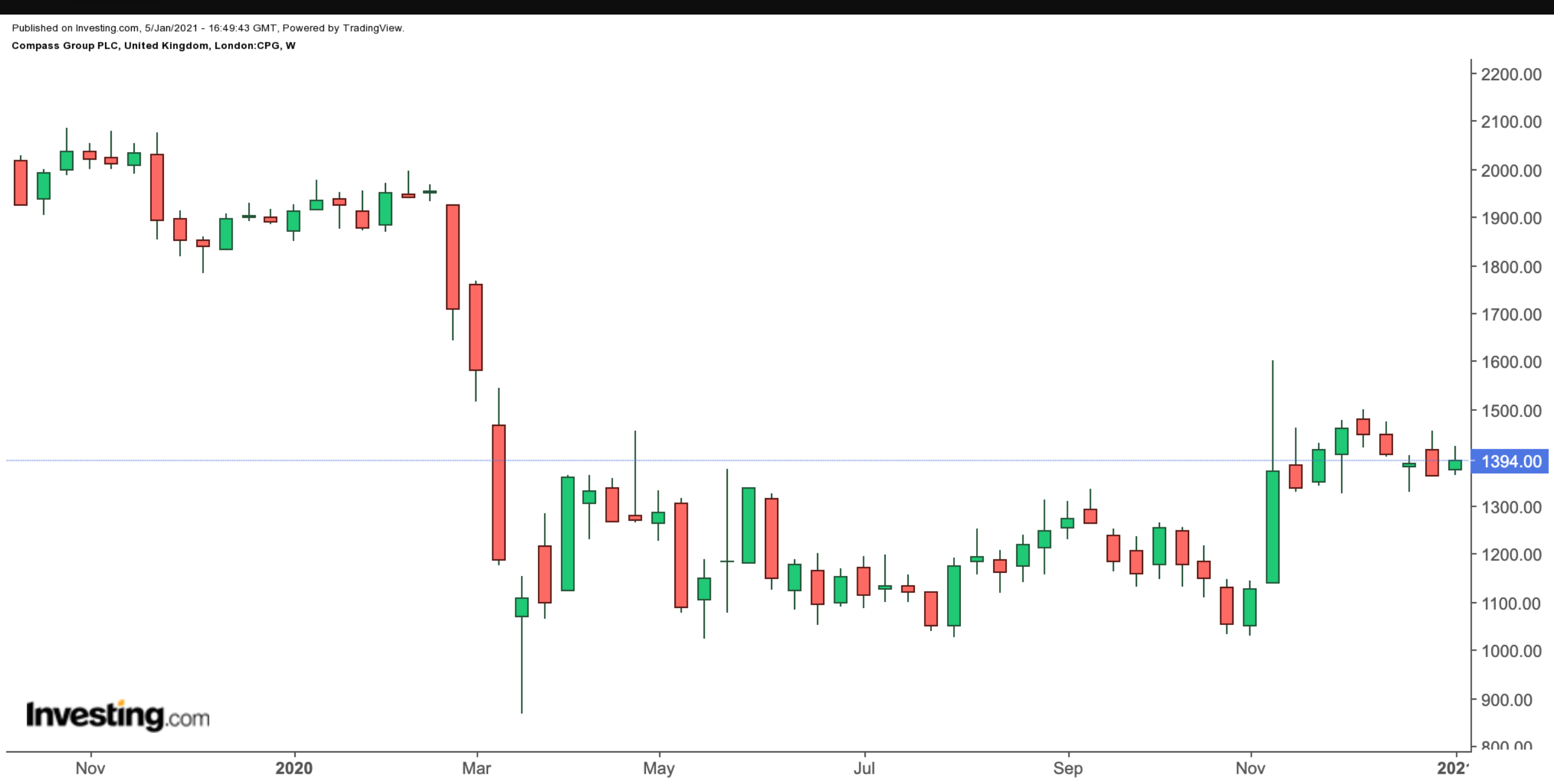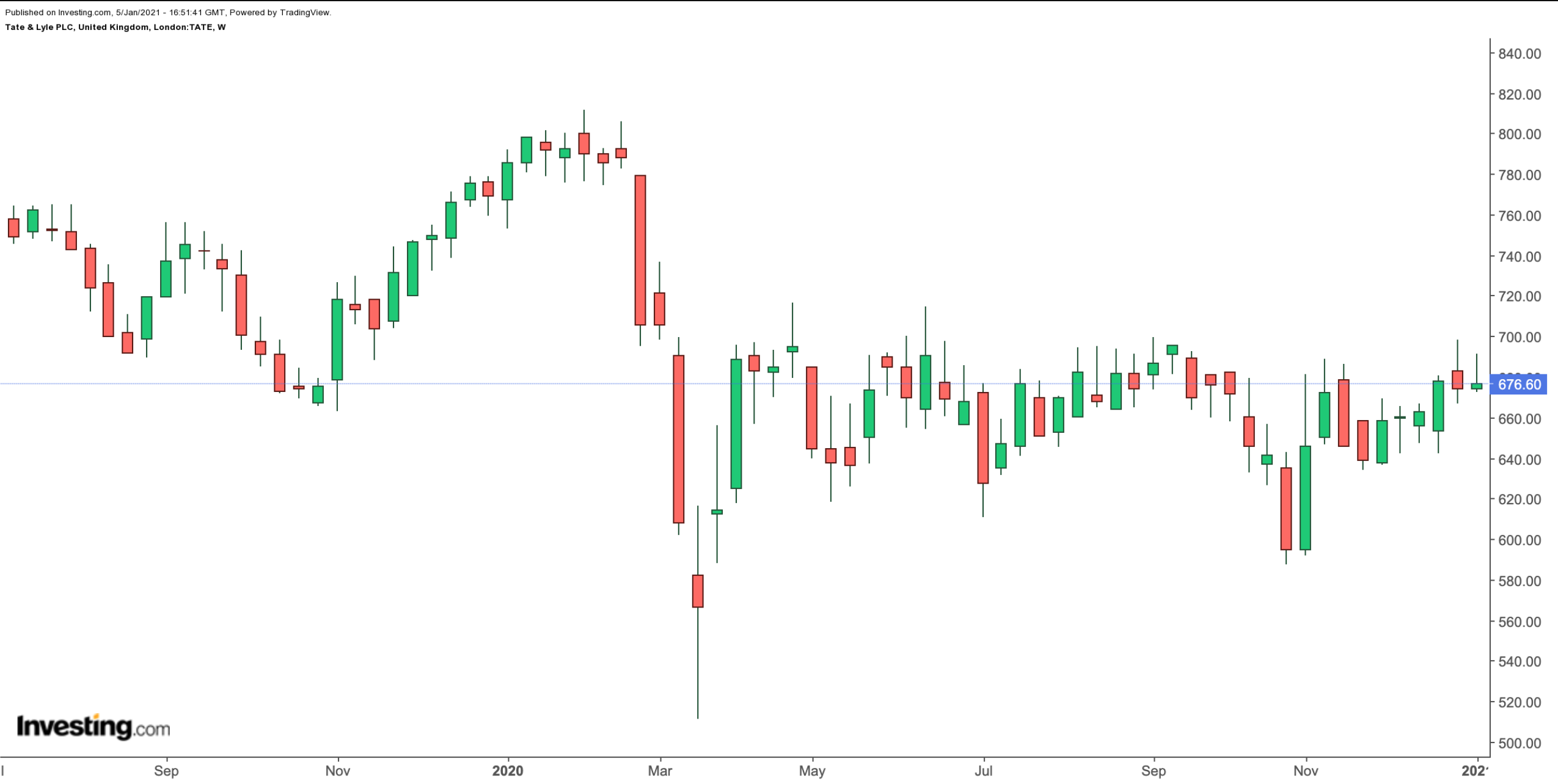As broader markets in the U.S. start 2021 on a choppy note, here are two UK-headquartered global food businesses that investors may want to keep on their radars in the coming weeks to smooth the waters. They are FTSE 100 member Compass Group (LON:CPG) (OTC:CMPGY) and FTSE 250 member Tate & Lyle (LON:TATE) (OTC:TATYY).
Here's a closer look at each:
1. Compass Group
Our first company is the Surrey-headquartered multinational contract caterer Compass Group. It provides food and support services to a range of firms, including industrial businesses, health-care facilities, educational establishments, sports and leisure venues as well as offshore oil rigs. It operates in 45 countries at more than 5,000 client locations.
In 2020, many of these establishments were closed in many parts of the world. As a result, over the past year, CPG stock is down around 25%. On Jan. 5, it closed at 1,394p (or $19.1 for U.S.-based shares).
 Compass Group Weekly Chart.
Compass Group Weekly Chart.
In November, Compass Group announced full-year results for the year ended Sept. 30. Revenue was £20.2 (or $27.5) billion, a decline of 18.8% year-on-year (YoY). Underlying profit before tax and EPS declined 75.9% and 77.8%, respectively. Free cash flow was £213 (or $290) million, down 82.9% YoY.
CEO Dominic Blakemore said:
“… in the fourth quarter we returned the business to profitability and are now cash neutral.… We are executing at pace and expect the underlying operating margin in the first quarter of 2021 will be around 2.5%…. We are investing in the business organically and inorganically to support our long term growth prospects, enhance our competitive advantages, and further consolidate our position as the industry leader in food services.”
Recent metrics highlight the adverse effect of the pandemic on the “global catering services and food contracts market, … which is expected to recover and grow at a CAGR of 8% from 2021 and reach $312.8 billion in 2023.”
CPG stock’s forward P/E and P/S are 39.06 and 1.15, respectively. As of Jan. 5, the UK has gone into a full lockdown for the third time in nine months. In the coming weeks, there could be other countries that follow it in varying degrees. All of this points to firms in this niche market needing some time before they get back to pre-pandemic business levels. Therefore, we’d like to wait for the next trading update by Compass Group before committing capital into the shares. In the case of a further 5%-7% decline, the stock would offer better long-term value.
On a final note, in 2020, the board decided not to issue an interim or final dividend.
2. Tate & Lyle
If you have a 'sweet tooth' for dividends, our next stock may appeal to passive income seekers—London-based Tate & Lyle. The company, which provides sweeteners and other bulk ingredients for food, beverage and industrial markets, has numerous laboratories and more than 4,000 employees globally.
In the past year, TATE stock is down close to 12%. On Jan. 5, it closed at 676.6p ($36.5 for U.S.-based shares). The current price supports a dividend yield of over 4%.
The company's origins go back to the efforts of Henry Tate, originally from Liverpool. Almost two decades after founding the company, Henry Tate opened the Thames Refinery in East London in 1878. The same year, the Tokyo Stock Exchange was established (as Tokyo Kabushiki Torihikijo) and Scottish-born inventor Alexander Graham Bell, whose company would later become AT&T (NYSE:T), demonstrated the telephone to Queen Victoria.
 Tate & Lyle Weekly Chart.
Tate & Lyle Weekly Chart.
Tate & Lyle is now the exclusive UK producer of the Splenda artificial sweetener. In 2015, Indiana-based Heartland Food Products Group bought the brand from McNeil Nutritionals, a subsidiary of Johnson & Johnson (NYSE:JNJ).
Last month Tate & Lyle acquired Sweet Green Fields, which offers natural sweetener stevia-based ingredients and solutions. Management believes that Tate & Lyle's "capabilities to create foods and beverages that are lower in sugar and calories" have increased significantly with this recent acquisition. The group's position in the ever-growing Asia Pacific market has also grown.
Tate & Lyle released its half-year results in early November. Revenue came at £389 million (or $529 million), a decrease of 4% YoY. Profit before tax was £180 million (or $245 million), up by 3% YoY and adjusted EPS also increased 9% YoY. Free cash flow came at £194 million (or $264 million), 11.8% higher than last year.
CEO Nick Hampton commented:
"We signed an agreement to acquire a speciality tapioca food starch business in Thailand expanding our customer offering of plant-based, clean-label texturant solutions… The duration and severity of the pandemic is unclear, out-of-home consumption remains below pre-pandemic levels and the annual sweetener contracting round is still to be completed. Given this uncertainty, we are not issuing guidance for the current year ending 31 March 2021."
Forward P/E and P/S ratios are 12.15 and 1.61, respectively. We believe the historically-modest valuation reflects any potential bad news. We like the shares both for growth potential and current passive income.
Leave a comment